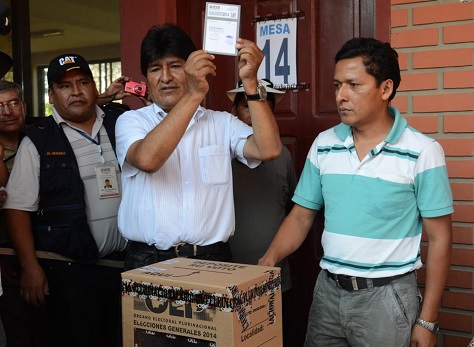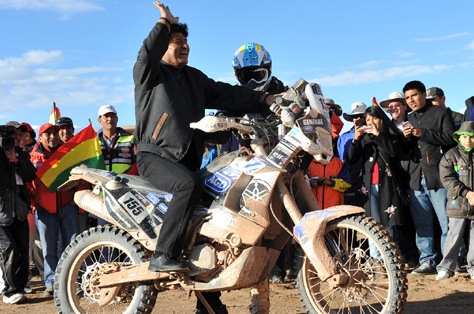 Photo credit to Aizar Raldes/AFP.
Photo credit to Aizar Raldes/AFP.
It wasn’t unexpected, but Evo Morales has extended his rule to a third consecutive term after Sunday’s general elections in Bolivia, where exit polls show that Morales leads his nearest rival, Samuel Doria Medina, by a margin of around 60% to 24%, easily avoiding a runoff and propelling him into position to become Bolivia’s longest-serving leader. ![]()
Although Morales himself introduced a two-term limitation in a new constitution promulgated by popular referendum in 2009, he argued that because he was elected to his first term in 2005 under the old Bolivian constitution, his 2009 reelection was his first ‘term’ under the new constitution, paving the way for Sunday’s reelection bid.
Unless the Bolivian Asamblea Legislativa Plurinacional (Plurinational Legislative Assembly) votes to overturn those term limits, however, Morales will now become a lame-duck president, whose final term will end in 2019.
Though the final results of Bolivia’s parliamentary elections are not yet available, it was also expected that Morales’s Movimiento al Socialismo (MAS, Movement for Socialism) would retain its control over both houses of the national assembly.
* * * * *
RELATED: Morales set to cruise to easy reelection in Bolivia
* * * * *
Morales, the first indigenous president of Bolivia, won reelection for many reasons, including his faithful support among Bolivia’s majority indigenous population. Bolivia’s economy is roaring, thanks to a commodity boom and high demand (and high prices) for Bolivian natural gas in neighboring Argentina and Brazil. Though Morales came to office as a firebrand disciple of the late socialist Venezuelan president Hugo Chávez, he has taken a more nuanced approach to economic policy than chavismo might otherwise indicate. Though Morales has nationalized many of Bolivian’s industries, including major gas, mining and telecommunications interests, even orthodox economic policymakers admit that the Morales government has done a good job of managing state assets. Morales has reduced Bolivian public debt, and he has used the proceeds of the Bolivian commodities bonanza to finance programs that have sharply reduced poverty in South America’s poorest country. Continue reading Bolivia election results: Morales wins landslide, but obstacles lurk

